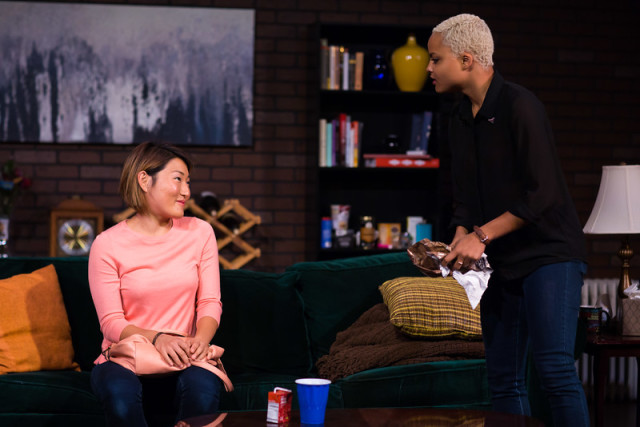 The scene freezes. Two women stare in shock—nay, awe—at each other on a darkened street, the soft warmth of the streetlights illuminating them in a sort of halo. Slowly, then all at once, they melt together in a soft touch of lips, sweet passion softening their features as they relish the feel of the other’s kiss.
The scene freezes. Two women stare in shock—nay, awe—at each other on a darkened street, the soft warmth of the streetlights illuminating them in a sort of halo. Slowly, then all at once, they melt together in a soft touch of lips, sweet passion softening their features as they relish the feel of the other’s kiss.
Thus is the central scene in Stop Kiss, directed by Asia Chiao as the Asian American Theater Project’s spring show. Written by Diana Son, Stop Kiss explores sexuality, love, violence, and hate by focusing on the story of Callie, a hardened New York City veteran, and Sara, a sweet Midwesterner teaching in the Bronx. What starts as a simple “friend of a friend” cat sitting request blossoms into an uncertain romance—but right when it begins, Callie and Sara fall victim to a hate crime in a perfectly nonlinear narrative.
Leading ladies Megan Gage as Callie and Hye Jeong Yoon as Sara are radically different in character, but one and the same in the raw sexuality and intense energy they bring onto the stage. Their interactions, from stolen glances to accidentally touching hands, are enough to give the audience butterflies in their stomachs. Gage is the quintessential cool New Yorker at the beginning of the show, treating us to a fantastic lip synch performance of the Spice Girls’ “Wannabe” in the opening scene, strutting and gliding about her messy apartment, highlighting the graceful (yet oddly sharp) movements and physical presentation of her character. Throughout the course of the show, Gage expertly transitions into a nervous, tense, and unsure character as she falls deeper in love with Sara, culminating in screaming matches and stumbling words. The show’s nonlinear narrative often requires Gage to immediately transition from a loving, laughing scene of romantic exploration with Sara to a somber, tear filled police interrogation or besides Sara’s hospital bed. She executes this transition perfectly, slowing her pace and bowing her head as she enters these scenes. Yoon is consistently sweet, happy, and optimistic when she is conscious, delivering her lines with a bright smile and an eager energy. She is intensely hilarious, performing comedic scenes with the perfect snappy timing and allowing the awkwardly innocent nature of her character to shine through and elicit giggles even when she isn’t speaking. On the opposite end of the spectrum, hospitalized Sara elicits tears as she shakily attempts to regain mobility tragically blank face. This Sara is so different from the Sara we have fallen in love with, and this contrast makes it all the more heartbreaking. Yoon pulls our heartstrings in every way imaginable.
The technical aspects of the show, despite it being held in a small venue, are absolutely phenomenal. The lighting cues, sound effects, and set transitions are executed with utmost precision and timeliness. The lighting design is beautiful and does an amazing job in highlighting the mood of each scene, using dull grey tones to mimic the dreariness of a hospital and warm oranges and yellows to create a homey feel to Callie’s apartment. In one scene, the transition from night to early morning to daytime is portrayed exclusively through smooth and subtle lighting transitions, from dark blues of night to pale blues of early morning to the yellows of daytime, an example of incredible precision and attention to detail. The sound design is equally precise and detailed, using sound clips from news shows to build tension between scenes. During a police interrogation between Detective Cole (Newton Cheng) and Callie, static is played in the background Cheng progressively gets louder and more aggressive. Cheng expertly portrays the character of an overworked and impatient NYPD detective, and as he tries harder and harder to elicit the true story from Callie. As Callie screams at him to stop and before she launches into the true story of the assault on Sara…The static stops.
On paper or its Wikipedia page, Stop Kiss seems to be a story defined by violence—but in performance, especially in this production by the Asian American Theater Project, it does not allow itself to be defined by hate. Stop Kiss is a powerful exploration into sexuality, latent homophobia, acceptance, and, most of all, love. It’s simultaneously a tale as tragic as Romeo and Juliet and a story as beautiful as The Princess Bride, but out of everything, Stop Kiss is an original masterpiece unto itself.
Images courtesy of Harrison Truong
